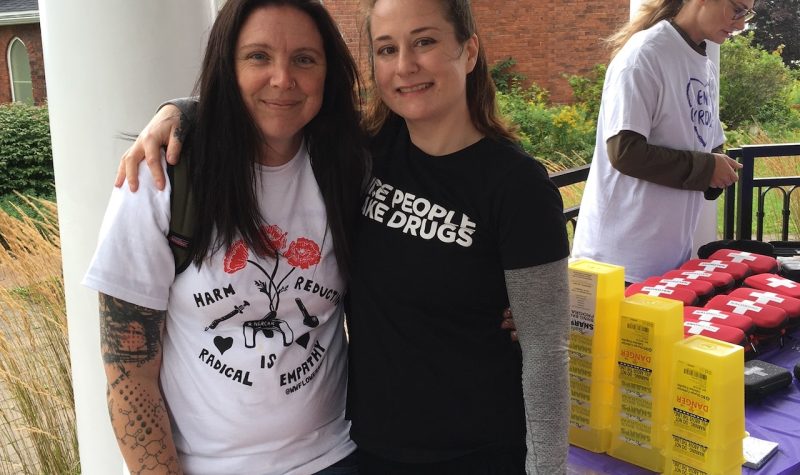By Ashley Legere’s count, about 22 people in Sackville and Amherst died between 2020 and 2022 due to unsafe drug supply and overdose. “We see a lot in the news of downtown eastside Vancouver,” says Legere, but the reality is, “it’s in every small town.”
Legere is known in Sackville as the driving force behind the town’s harm reduction vending machine, located inside the Main Street foyer of the Sackville United Church downtown. These days, she works for the Cumberland Homelessness & Housing Support Association, where she leads a team providing shelter options and meals to about 45 individuals. On Thursday, she was in Victoria Park in Amherst, helping mark International Overdose Awareness Day.
In the course of her career so far, Legere has a list of 81 names, all people who have died since 2010 in the Amherst, Sackville and Moncton area, whom she has personally known. The loss is significant, she says, especially when you consider the impact on those left behind. “It’s their family, it’s their co-workers, it’s their friends,” says Legere.
The job is tough but Legere isn’t beaten down -- rather, she radiates compassionate energy. “I don’t know what life is if you don’t love people,” says Legere. “And feeling the loss of 80 people heavily just means I’ve loved that many people. And I think that’s the whole point, right?”
Legere figures she has trained about 14,000 people so far on how to administer the life-saving shot Narcan (also known as Naloxone) that can reverse the effects of opioids and prevent overdose deaths. “That’s 14,000 people who have been able to save lives,” she says, noting that her stepson used a Narcan shot to spare someone from an overdose death this summer. She carries a pack with her “at all times,” and a number of people walked away from Victoria Park on Thursday with kits, and the brief, basic training on how to use them.
Legere says she is a “harm reductionist at heart”, which is why she’s an advocate for safer supply as way to help combat the dangers that are posed by the thriving illegal drug industry.
“We celebrate when someone opens up a bar… we’re so excited for that. But that’s a safe consumption site,” says Legere. And the liquor store? “That’s the safe supply,” she says, “for one of the most [deleterious] substances in the whole world.”
When it comes to cigarettes, cannabis, and prescription drugs, “these are heavily regulated substances that we look at as acceptable,” says Legere. “They’re just a part of our culture.” But when it comes to illicit substances, there’s stigma, illegal markets, and danger.
Katie Upham is grateful not to have to deal with those issues any longer. Upham is an advocate with Moms Stop the Harm, a network of Canadian families impacted by substance use related harms and deaths. The group participated in Thursday’s event. Upham is also a daily user of Dilaudid, something she gets via prescription, to guarantee her a safe supply. She didn’t always have that opportunity.
“I used to spend a lot of time looking for drugs, spent a lot of money buying drugs,” says Upham. “I was buying other people’s prescriptions, and getting it on the street. And sometimes those would be pressed pills that wouldn’t actually be Dilaudid. It would be tainted with fentanyl.”
These days Upham has a prescription that she picks up everyday. “I know how much I’m taking, I know what’s in it, and I haven’t overdosed because, you know, I have that regulated, safe supply.”
And although she needs the Dilaudid daily to stay well (“without the drugs every day, I’m sick,” she says,) her quality of life is way ahead of where it was previously, when she spent her days accessing drugs. “I have time to do other things,” says Upham, “I like rock climbing. I like playing pickleball. I’m a normal person,” she says with a smile. Upham is well-spoken, clear and confident. Earlier in the event she addressed the crowd, speaking on behalf of Moms Stop the Harm.
She knows herself, and has thought about her future. “At some point, I do want to change my relationship with drugs and maybe get off of my safer supply,” she says. “But for now, I’m happy to have it. I’m very, very fortunate… Very few Nova Scotians have access to it.”
There are few programs in New Brunswick and Nova Scotia where people can access safe supply. The MOSH Safer Supply Project in Halifax and River Stone Recovery Centre in Fredericton have programs, and there are some doctors who prescribe safer supply.
Safer supply as a concept is being used as political bait recently, with Conservative leader Pierre Poilievre positing (but not demonstrating) that it does more harm than good. In May, the Conservatives put forward a failed motion to thwart federal policies that support safe supply programs.
“We really need to, you know, do some inner work,” says Upham, “and check our biases towards groups of people that are different from ourselves. You don’t have to be on the frontline of the accidental drug poisoning crisis to make a difference.”


